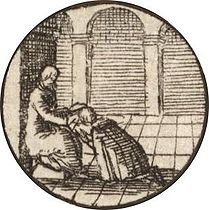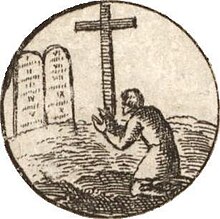Confession (Lutheran Church)

In theLutheranChurch,Confession(also calledHoly Absolution) is the method given by Christ to the Church by which individual men and women may receive the forgiveness of sins; according to theLarge Catechism,the "third sacrament" of Holy Absolution is properly viewed as an extension of HolyBaptism.[1]UnlikeRoman Catholicism,the practice of private confession in theLutheranChurch is voluntary, not obligatory.
Beliefs
[edit]The Lutheran Church practices "Confession and Absolution" [referred to as the Office of the Keys] with the emphasis on the absolution, which is God's word of forgiveness. Indeed, Lutherans highly regard Holy Absolution. They, like Roman Catholics, seeJames 5:16andJohn 20:22–23as biblical evidence for confession.[2]Confession and absolution is done in private to the pastor, called the "confessor"with the person confessing known as the" penitent ". In confession, the penitent makes anact of contrition,as the pastor, actingin persona Christi,announces the formula of absolution. Prior to the confession, the penitent is to review theTen Commandmentstoexamine his or her conscience.[3]
In the Lutheran Church, like the Roman Catholic Church, the pastor is bound by theSeal of the Confessional.Luther's Small Catechismsays "the pastor is pledged not to tell anyone else of sins to him in private confession, for those sins have been removed." If the Seal is broken, it will result inexcommunication.[2]In the nineteenth and twentieth centuries, weekly private confession became less expected;[citation needed]at the present time, it is, for example, expected before partaking of theEucharistfor thefirsttime.[4][non-primary source needed]It is also encouraged to be done frequently in a year[5](specifically before Easter). In many churches, times are set for the pastor to hear confessions.[6][7]

In line with Luther's initial statement inhis Large Catechism,some Lutherans speak of only two sacraments,[9]Baptism and the Eucharist, although later in the same work he calls Confession and Absolution[10]"the third sacrament."[11]The definition of sacrament in theApology of the Augsburg Confessionlists Absolution as one of them.[12]Luther went toconfessionall his life.[13]Although Lutherans do not consider the other four rites as sacraments, they are still retained and used in the Lutheran church.Philipp Melanchthonspeaking about the Confession in the Lutheran Church, claims that "we do not wish to sanction the torture [the tyranny of consciences] of the Summists, which notwithstanding would have been less intolerable if they had added one word concerning faith, which comforts and encourages consciences. Now, concerning this faith, which obtains the remission of sins, there is not a syllable in so great a mass of regulations, glosses, summaries, books of confession. Christ is nowhere read there".[14]
Martin Luther on Confession
[edit]In his 1529 catechisms,Martin Lutherpraised confession (before a pastor or a fellow Christian) "for the sake ofabsolution",the forgiveness of sins bestowed in an audible, concrete way.[15]The Lutheran reformers held that a complete enumeration of sins is impossible[16]and that one's confidence of forgiveness is not to be based on the sincerity of one's contrition nor on one's doing works of satisfaction imposed by the confessor (penance).[17]The Roman Catholic church held confession to be composed of three parts:contritio cordis( "contrition of the heart" ),confessio oris( "confession of the mouth" ), andsatisfactio operis( "satisfaction of deeds" ).[18]The Lutheran reformers abolished the "satisfaction of deeds," holding that confession and absolution consist of onlytwoparts: the confession of the penitent and the absolution spoken by the confessor.[19]Faith or trust inJesus'complete active and passive satisfaction is what receives the forgiveness and salvation won by him and imparted to the penitent by the word of absolution.
Form of Confession
[edit]
Lutheran confession (in the same manner asconfessionin theCatholic Church) can be done in the church chancel with the penitent kneeling at thealtar railand the pastor sitting in front of them, in the privacy of the pastor's office, or sometimes in aconfessional.The words below, taken from theLutheran Service Bookand used in most confessions, say:
The penitent begins by saying:
Please hear my confession and pronounce forgiveness in order to fulfill God's will. I, a poor sinner, plead guilty before God of all sins. I have lived as if God did not matter and as if I mattered most. My Lord's name I have not honored as I should; my worship and prayers have faltered. I have not let His love have its way with me, and so my love for others has failed. There are those whom I have hurt, and those whom I have failed to help. My thoughts and desires have been spoiled with sin. What troubles me particularly is that...
Here, the penitent is to confess whatever they have done against the commandments of God, according to their own place in life. The penitent continues.
I am sorry for all of this and ask for grace. I want to do better.
The pastor continues:
God be merciful to you and strengthen your faith. Do you believe that my forgiveness is God's forgiveness?
The penitent will say:
Yes.
The pastor places his hand on the head of the penitent and says the following:
In the stead and by the command of my Lord Jesus Christ I forgive you all your sins in the name of the Father and of the+Son and of the Holy Spirit. Amen.
The pastor dismisses the penitent.
Go in peace.
The penitent responds:
Amen.
Another suggested form for Confession was outlined by Luther himself in theSmall Cathechismof 1529 (Part V. HOW THE UNLEARNED SHOULD BE TAUGHT TO CONFESS):
You speak unto the confessor thus:
Reverend and dear sir, I beseech you to hear my confession, and to pronounce forgiveness to me for God's sake
Proceed!
I, a poor sinner, confess myself before God guilty of all sins; especially I confess before you that I am a manservant, a maidservant, etc. But, alas, I serve my master unfaithfully; for in this and in that I have not done what they commanded me; I have provoked them, and caused them to curse, have been negligent [in many things] and permitted damage to be done; have also been immodest in words and deeds, have quarreled with my equals, have grumbled and sworn at my mistress, etc. For all this I am sorry, and pray for grace; I want to do better.
A master or mistress may say thus:
In particular I confess before you that I have not faithfully trained my children, domestics, and wife [family] for God's glory. I have cursed, set a bad example by rude words and deeds, have done my neighbor harm and spoken evil of him, have overcharged and given false ware and short measure.
And whatever else he has done against God's command and his station, etc. But if any one does not find himself burdened with such or greater sins, he should not trouble himself or search for or invent other sins, and thereby make confession a torture, but mention one or two that he knows. Thus:
In particular I confess that I once cursed; again, I once used improper words, I have once neglected this or that, etc.
Let this suffice. But if you know of none at all (which, however, is scarcely possible), then mention none in particular, but receive the forgiveness upon the general confession which you make before God to the confessor.
Then shall the confessor say:
God be merciful to thee and strengthen thy faith! Amen.
Furthermore:
Dost thou believe that my forgiveness is God's forgiveness?
Answer:
Yes, dear sir.
Then let him say:
As thou believest, so be it done unto thee. And by the command of our Lord Jesus Christ I forgive thee thy sins, in the name of the Father and of the+Son and of the Holy Spirit. Amen. Depart in peace.
But those who have great burdens upon their consciences, or are distressed and tempted, the confessor will know how to comfort and to encourage to faith with more passages of Scripture. This is to be merely a general form of confession for the unlearned.[20]
References
[edit]- ^"Holy Baptism".
- ^abAn explanation of The Small CatechismArchived2009-10-07 at theWayback Machine
- ^"Archived copy"(PDF).Archived fromthe original(PDF)on 2010-02-04.Retrieved2010-02-02.
{{cite web}}:CS1 maint: archived copy as title (link)Retrieved 2010-02-02. - ^Apology of the Augsburg Confession,article 24, paragraph 1. Retrieved 2010-02-02.
- ^The Defense of the Augsburg Confession; Article XI: Of Confession.Retrieved 2010-02-02.
- ^An example of a church that has a set time for confessions[permanent dead link].Retrieved 2010-02-02.
- ^"St. Mark Lutheran Church".St. Mark Lutheran Church.Retrieved2024-03-01.
- ^Augsburg Confession, Article XII: Of Repentance
- ^Luther's Large CatechismIV, 1: "We have now finished the three chief parts of the common Christian doctrine. Besides these we have yet to speak ofour two Sacramentsinstituted by Christ, of which also every Christian ought to have at least an ordinary, brief instruction, because without them there can be no Christian; although, alas! hitherto no instruction concerning them has been given "(emphasis added; cf. Theodore G. Tappert, trans. and ed.,The Book of Concord: The Confessions of the Evangelical Lutheran Church,(Philadelphia: Fortress Press, 1959), 733).
- ^John 20:23,and Engelder, T.E.W.Popular Symbolics.St. Louis: Concordia Publishing House, 1934. pp. 112-3, Part XXVI "The Ministry", paragraph 156.
- ^Luther's Large CatechismIV, 74-75: "And here you see that Baptism, both in its power and signification, comprehends also thethird Sacrament, which has been called repentance,as it is really nothing else than Baptism "(emphasis added; cf. Theodore G. Tappert, trans. and ed.,The Book of Concord: The Confessions of the Evangelical Lutheran Church,(Philadelphia: Fortress Press, 1959), 751).
- ^TheApology of the Augsburg ConfessionXIII, 3, 4: "If we define the sacraments as rites, which have the command of God and to which the promise of grace has been added, it is easy to determine what the sacraments are, properly speaking. For humanly instituted rites are not sacraments, properly speaking, because human beings do not have the authority to promise grace. Therefore signs instituted without the command of God are not sure signs of grace, even though they perhaps serve to teach or admonish the common folk. Therefore, the sacraments are actually baptism, the Lord’s Supper, and absolution (the sacrament of repentance)" (cf. Tappert, 211).
- ^"Article XIII. (VII): Of the Number and Use of the Sacraments".bookofconcord.org.2011.Retrieved8 October2011.
- ^"Defense of the Augsburg Confession".Book of Concord.Retrieved2013-11-02.
- ^John 20:23;Matthew 16:19;18:18
- ^Augsburg ConfessionXI with reference toPsalm 19:12
- ^"Christian Cyclopedia".Archived fromthe originalon 2004-11-23.Retrieved2010-01-20.
Rejected... are those who teach that forgiveness of sin is not obtained through faith but through the satisfactions made by man.
- ^"Christian Cyclopedia".Archived fromthe originalon 2004-11-23.Retrieved2010-01-20.
The acts of the penitent himself, namely contrition, confession, and satisfaction, constitute, as it were, the matter of this sacrament.
- ^Large CatechismVI, 15
- ^Bente, Gerhard Friedrich and William Herman Theodore Dau. Concordia Triglotta The Symbolical Books of the Evangelical Lutheran Church, German-Latin-English. St. Louis: Concordia Publishing House, 1921. pp. 555-556.

